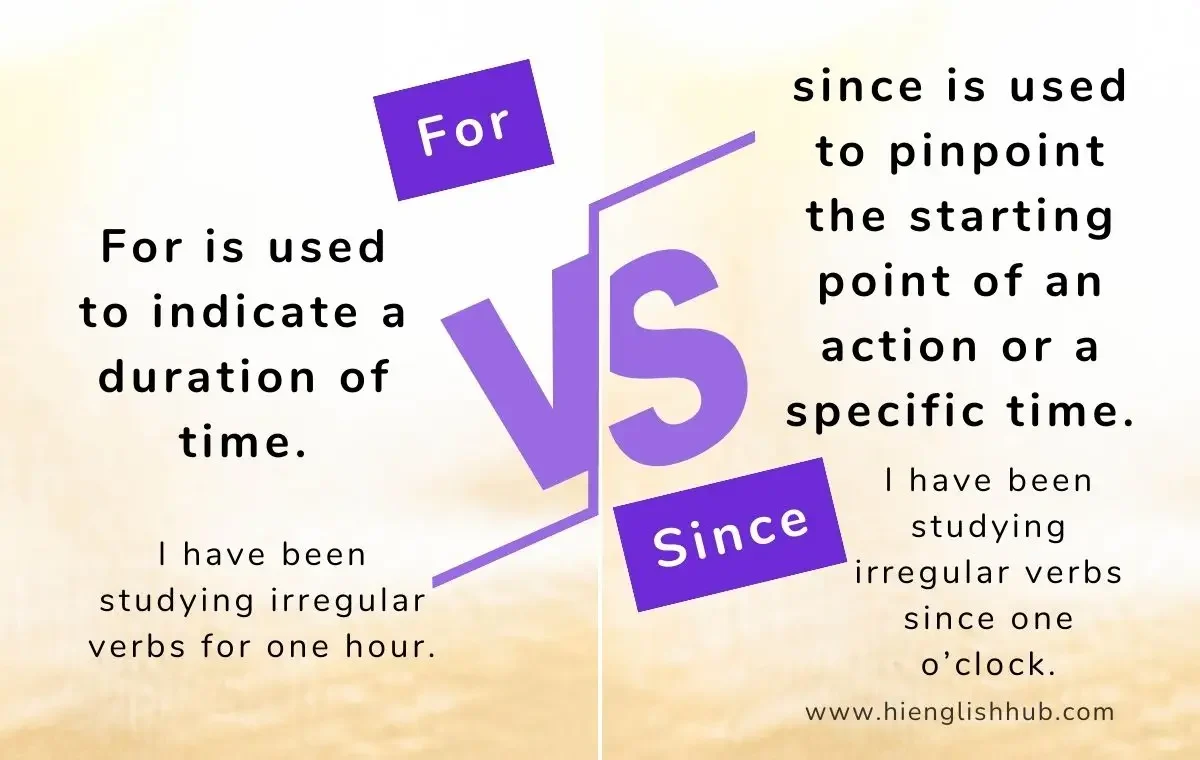Have you ever wondered when to use “for” and when to use “since” in English?
Don’t worry; you’re not alone!
In this blog post, we’ll explore the differences between “for” and “since” in simple terms, provide examples to illustrate their usage, and even throw in some exercises to help you practice.
Let’s dive in!
Difference Between For And Since
“For” is your go-to when you want to express the duration of an action. It helps answer the question, “How long?” and provides a sense of the time span during which something has been happening.
Example:
I’ve been learning English on HiEnglishHub.com for a year. This tells us that the action of learning English has been ongoing for a year, and the speaker continues to use this website.
On the other hand, “since” points directly to the starting point of an action. It’s used when you want to emphasize when something began.
I have been studying English since Monday.—This sentence tells us that the studying began on Monday and is still happening.
When To Use Since And For
Both since and for function as prepositions, and while prepositions can generally be applied across various tenses, these two are commonly found in the context of present perfect and present perfect continuous.
For And Since Examples
Present Perfect:
- For: He has lived in this city for five years. This sentence uses “for” to indicate the duration of time (five years) during which he has been living in the city.
- Since: He has lived here since 2017. Here, “since” indicates the starting point in time (2017) when he began living in the city.
Present Perfect Continuous:
- For: She has been painting for the entire afternoon. In this case, “for” specifies the duration of the painting activity, which has been ongoing for the entire afternoon.
- Since: She has been painting since 2 o’clock. “Since” in this sentence points out the starting time (2 o’clock) when she began painting and suggests that the activity has continued up to the present moment.
For And Since Exercises

Fill in the blanks with “for” or “since” in the following sentences:
- I have been learning Spanish _____ six months.
- She has been working on her project _____ yesterday.
- We have known each other _____ high school.
- They have been waiting _____ ages.
Answers:
- I have been learning Spanish for six months.
- She has been working on her project since yesterday.
- We have known each other since high school.
- They have been waiting for ages.
FAQs On For And Since
What Is the Difference Between For And Since?
For is used to indicate a duration of time. However, since is used to pinpoint the starting point of an action or a specific time.
For: I have been studying irregular verbs for one hour.
Since: I have been studying irregular verbs since one o’clock.
Which Tense Is Used For Since And For?
“For” and “since” are often used with the present perfect tense and the present perfect continuous tense.
- I have played the piano for two hours.
- She has known him since childhood.
- I have been working at the new job since last month.
- I have been gardening since morning.
Can We Use Since Morning?
Yes, you can use since morning to indicate the starting point of an action that began in the morning, like I have been busy since morning.
Can We Use Since Yesterday?
Yes, you can use since yesterday to indicate the starting point of an action that began yesterday, for instance, I have been waiting for your call since yesterday.

